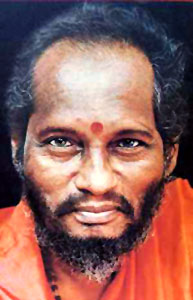 Swami Muktananda was an Indian Hindu Guru. He was the Founder of Siddha Yoga, a new religious movement. He was the author of number of books including his autobiography entitled `The Play of Consciousness`.
Swami Muktananda was an Indian Hindu Guru. He was the Founder of Siddha Yoga, a new religious movement. He was the author of number of books including his autobiography entitled `The Play of Consciousness`.
Muktananda was born in Mangalore in the state of Karnataka in India in a wealthy family. His birthname was Krishna. At the age of fifteen Muktananda encountered Bhagawan Nityananda , a wandering Avadhoot and was profoundly influenced. Muktananda studied under Siddharudha Swami at Hubli where he learned Sanskrit, Vedanta and all branches of Yoga. Thus he got prepared for Sannyasa and becoming Swami Muktananda. He also traveled many parts of India on foot.
In the year 1947, Muktananda went to Ganeshpurito have the Darshan of Bhagawan Nityananda. On that year in the early morning of August fifteen he received `Shaktipat initiation` from his Guru. According to his narration it was a profound and sublime experience. Muktananda spent the next eight years of his life in living and meditating in a little hut in Yeola. He wrote about his `Sadhana`and meditation experiences in his autobiography published in 1978. The most interesting part of it was the Kundalini related experience. In the year 1956, Nityananda gave Sami Muktananda a small piece of land at Gavdevi, near Ganeshpuri. Muktananda established an ashram there in that part of land.
In the year 1970s, Muktananda started his journey to the west to make them introduced with tradition of Siddha Yoga on behalf of his guru Bhagwan Nityananda. Swami Muktananda established Gurudev Siddha Peeth as a public trust in India as administrative center and also established the SYDA Foundation in the United States to administer the global work of Siddha Yoga meditation. Swami Muktananda wrote many books, sixteen of which are still kept in print by the SYDA foundation.
In the month of May of 1982, Muktananda appointed swami Chidvilasananda and his brother Swami Nityanand as his successors. Chidvilasananda was his former translator. Swami Nityanand later resigned and formed his own group. Muktananda died in October 1982 and was buried at Ganeshpuri and his Samadhi shrine is at Siddha peeth ashram.
Swami Muktananda`s main messages were to "Honor your Self, Worship your Self, Meditate on your Self, God dwells within you as you." and "See God in Each Other".
Sarah Caldwell stated in 2001, in the academic journal Nova Religio, that Swami Muktananda was both an enlightened teacher and a secret practitioner of an esoteric form of Tantric sexual yoga.




















